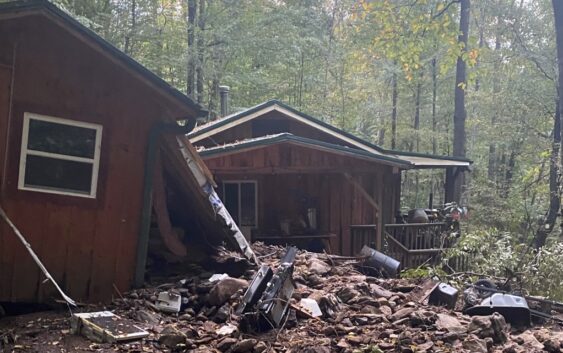- Temporary bridges in Avery County at risk due to severe weather threat
- FEMA extends aid as Hurricane Helene recovery efforts surpass $360M
- Nearly every North Carolina wildfire caused by people, researchers say
- Weather IQ: How do wildfires ignite?
- EPA faces backlash for debris site near Los Angeles communities after massive wildfires
FEMA extends aid as Hurricane Helene recovery efforts surpass $360M

FEMA said more than 153,000 families in North Carolina are being help with financial assistance. Deadline for aid applications have been extended to March 8.
CHARLOTTE, N.C. — The Federal Emergency Management Agency has released an update on their ongoing recovery efforts from Hurricane Helene.
FEMA’s fact sheet said $361.6 million has been approved to help 153,557 households and individuals, which includes money to help people find temporary housing as they rebuild.
The agency also said more than 2,600 households are staying in temporary hotel and motel rooms, down about 200 households from FEMA’s previous update. 160 households have been placed in temporary housing units while nearly 2,800 households have received a combined $8.2 million in rental assistance.
The deadline for aid applications has been extended to March 8.
Available aid includes money for temporary housing, such as rental assistance or reimbursement for hotel costs, and support for the repair or replacement of primary homes, including privately-owned access routes like driveways, roads, or bridges. Additionally, FEMA offers funds for disaster-related expenses, including the repair or replacement of personal property and vehicles, as well as costs for moving and storage, medical, dental, child care, and other miscellaneous items.
That extension for aid applications comes in response to a request from the state of North Carolina. The House Select Committee on Helene Recovery met for the first time Wednesday. Lawmakers heard from officials from GROW NC, NC Emergency Management and the state’s fiscal research division.
Those state officials provided more context on approved federal funding for Helene relief, outlining the gap between what they requested and what the state will see. The GROW NC speakers said the state has requested 25.7 billion in federal funds, while they are only likely to see $15.7 billion.
“We would like for them to let us have a little bit more hand in rebuilding because we know what we know what we need, but the rebuilding of houses is going to be just a daunting task,” Rep. Ray Pickett, a Republican representing parts of Alleghany, Ashe, and Watauga counties, said.
The Small Business Administration has also approved $105.4 million low-interest disaster loans. FEMA has awarded about $14 million to repair roads and bridges. More than 3.9 million cubic yards of debris has been cleared from public areas by state and federal contractors.
FEMA further said more than $50 million in federal unemployment benefits have been distributed to over 10,000 survivors. Agricultural Recovery Centers are also being set up in multiple counties to help farmers rebuild.
President Donald Trump has been critical of the agency’s response to Helene. In a visit to western North Carolina last week, the President said he was going to recommend FEMA goes away, instead paying states directly for their work and cutting out the federal agency that “complicates” recovery.
“FEMA has been a very big disappointment,” Trump said. “They cost a tremendous amount of money, it’s very bureaucratic and it’s very slow. Other than that, we’re very happy with them.”
Homeowners and renters in the following counties and the Eastern Band of Cherokee Indians with uninsured losses from Helene are eligible to apply for FEMA assistance: Alexander, Alleghany, Ashe, Avery, Buncombe, Burke, Cabarrus, Caldwell, Catawba, Cherokee, Clay, Cleveland, Forsyth, Gaston, Graham, Haywood, Henderson, Iredell, Jackson, Lee, Lincoln, Macon, Madison, McDowell, Mecklenburg, Mitchell, Nash, Polk, Rowan, Rutherford, Stanly, Surry, Swain, Transylvania, Union, Watauga, Wilkes, Yadkin, and Yancey.
There are several ways to apply for FEMA assistance:
- Visit a Disaster Recovery Center (DRC). To find the nearest center, go to fema.gov/drc.
- Apply online at DisasterAssistance.gov.
- Download the FEMA App for mobile devices.
- Call the FEMA helpline at 800-621-3362 between 7 a.m. and midnight. Assistance is available in most languages. If you use a relay service, such as video relay (VRS), captioned telephone, or another service, provide FEMA with your number for that service.